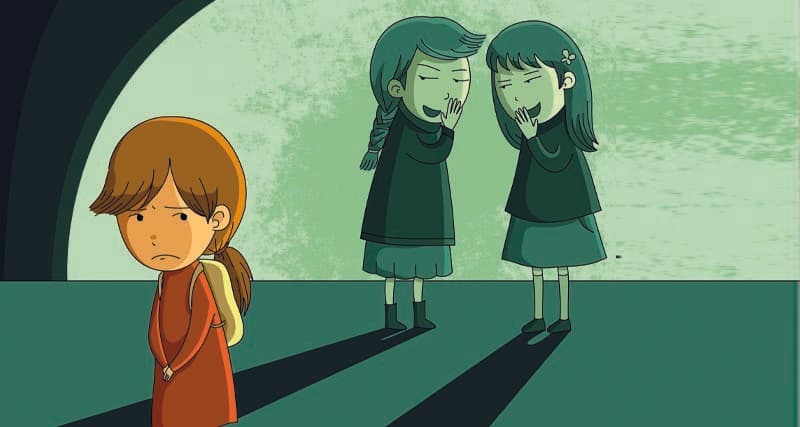Amaha / / / Is Your Child Involved in Bullying? Here’s What to Do
ARTICLE | 5 MINS READ
Is Your Child Involved in Bullying? Here’s What to Do
Published on
10th Mar 2025

It’s never easy to hear that your child has been involved in bullying. You can never imagine that your child would intentionally try to hurt and dominate another person, specifically in the context of an imbalance of power. What makes things even more complex today is that bullying has gone beyond physical and verbal harassment into the realm of technology. So what should one do when confronted with the reality that their child has been indulging in bullying behaviour?
Here’s a step by step guide on how to move forward from here.
Step 1: Acknowledge
Take a breath and be calm so you can be receptive to what you’ve heard. Ask for more details, and try to process what you’re hearing as carefully as possible. Don’t try and shift the blame or justify your child’s behaviour before you know more. Get the contact details of the parent or teacher who informed you of the situation so that you can follow up with them later, and thank them for bringing the matter to your notice.
Step 2: Try to understand
You know your child better than anybody else. Try and understand why they would resort to such behaviour. Research shows that bullying is often a sign of a low empathy or low self-esteem, the expression of anger or a need to be in control or simply a way to impress peers or imitate family members. It could also be caused by inadequate parental attention or discipline. Ask yourself honestly what the source of your child’s behaviour could be. Keep in mind that there’s also a chance that the situation was misunderstood or your child was just trying to defend themselves, but don’t use it as an excuse.
Step 3: Talk it out
Sit down with your child and tell them what you have heard. Let them know that this is a serious matter, and you want to hear their side of the story. If it turns out the complaint was not a misunderstanding, explain to your child the consequences of their behaviour - especially on the target of their bullying. Help them develop better strategies to deal with conflict. Teach them better social skills and responsible decision making.
Step 4: Set down new boundaries
Make your expectations of your child very clear. Create clear and consistent consequences for bullying behaviour. Let them know that if they’re having trouble, they should approach a teacher or you rather than taking matters into their own hands. Let other family members know that they have to set a better example by avoiding gossip in the house and modelling non-violent behaviour.
Step 5: Follow up
Find out from teachers if your talk has translated into a change in your child’s behaviour at school. Praise your child when they show compassion for others. If the behaviour does not stop, seek counselling for your child as soon as possible.
References
"ACTION - PACER Center." http://www.pacer.org/parent/php/PHP-c109.pdf. Accessed 20 Jan. 2017.
"STOMP Out Bullying :: What To Do If Your Child Is A Bully." http://www.stompoutbullying.org/index.php/information-and-resources/parents-page/what-do-if-your-child-bully/. Accessed 20 Jan. 2017.
"(Gulp!): What to Do When Your Child Is the Bully - Care.com Community." https://www.care.com/c/stories/3296/gulp-what-to-do-when-your-child-is-the-bu/. Accessed 20 Jan. 2017.
(n.d.). When Your Kid Is the Bully: What to Do - Parents. Retrieved January 20, 2017, from http://www.parents.com/kids/problems/bullying/when-your-child-is-the-bully/
(2011, August 9). 7 Signs That Your Kid's a Bully - Back to School ... - Everyday Health. Retrieved January 20, 2017, from http://www.everydayhealth.com/kids-health-pictures/7-signs-that-your-kid-is-a-bully.aspx
(n.d.). ACTION - PACER Center. Retrieved January 20, 2017, from http://www.pacer.org/parent/php/PHP-c109.pdf
(n.d.). What should you do if your child is 'the bully'? - BBC News - BBC.com. Retrieved January 20, 2017, from http://www.bbc.com/news/education-24963971
(n.d.). Your child bullying others | Raising Children Network. Retrieved January 20, 2017, from http://raisingchildren.net.au/articles/bullying_-_your_child_bullying.html
(n.d.). Teaching Kids Not to Bully (for Parents) - KidsHealth. Retrieved January 20, 2017, from http://kidshealth.org/en/parents/no-bullying.html
(2013, November 18). What to Do If Your Child Is a Bully - Speakeasy - WSJ. Retrieved January 20, 2017, from http://blogs.wsj.com/speakeasy/2013/11/18/what-to-do-if-your-child-is-a-bully/